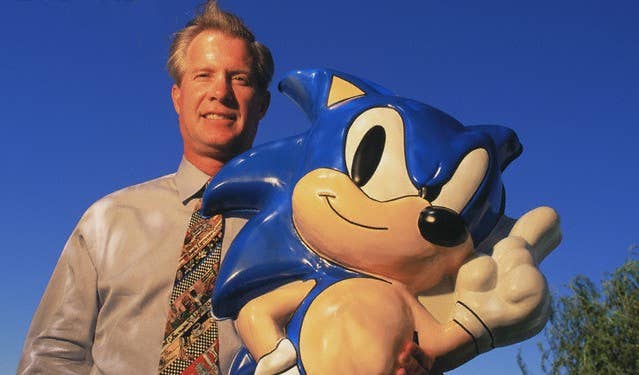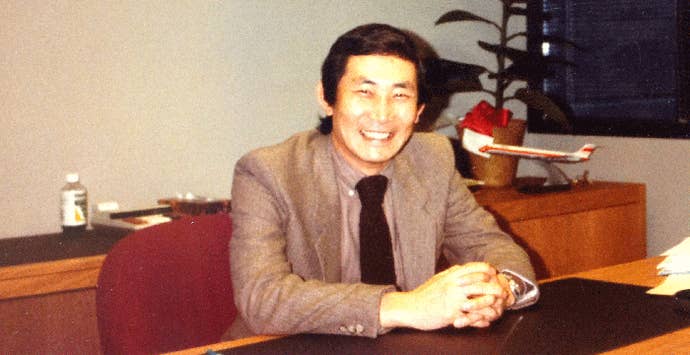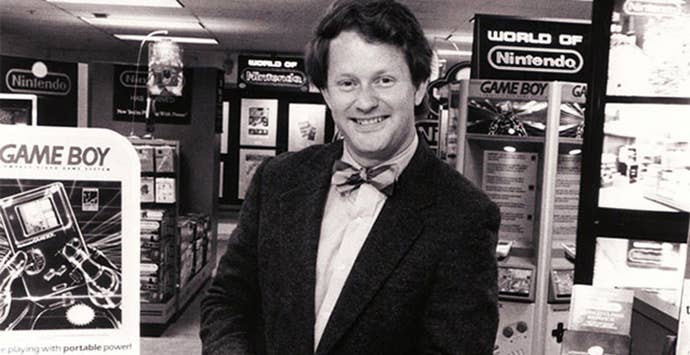Console Wars Author Blake J. Harris on Spinning David and Goliath out of Sonic and Mario
We talk with the man whose recent history of Sega's struggle against Nintendo makes 16-bit competition seem so compelling.
This article first appeared on USgamer, a partner publication of VG247. Some content, such as this article, has been migrated to VG247 for posterity after USgamer's closure - but it has not been edited or further vetted by the VG247 team.
Though I had to plow through it in just three days, I thoroughly enjoyed Blake J. Harris' Console Wars: Sega, Nintendo, and the Battle that Defined a Generation -- and if you don't believe me, check out my recent review. Though the book is absolutely exhaustive on the subject of Sega versus Nintendo, I still had some questions when I reached the final page. Thankfully, Blake was ready and willing to discuss his intentions and inspirations, as well as some of the more surprising facts he stumbled upon during his research.
USg: Can you tell me where you were, personally, during the console wars?
BJH: I'm 31 years old right now, and I got an 8-bit NES in the Christmas of '88. Whenever I talk about my memories from that time, I often say "we" because I played it so often with my younger brother, and it was the only thing that kept us friends during this time period. We absolutely loved it: Zelda, Bubble Bobble, and Contra were our favorites -- we also loved all of the Mario games. And, as people who loved Nintendo, we naturally wanted a Super Nintendo when we heard about it. I remember asking my dad, and I vividly recall him telling me he wouldn't get us a Super Nintendo because Nintendo would then come out with a "Super Duper Nintendo" and a "Super Super Duper Nintendo." He didn't want to get stuck [in a pattern of] buying these things.
At the time I thought he was being kind of silly or kind of mean, but, looking back, that was part of the reason I wanted to write this book. At its core, he was really saying that he did not like Nintendo's business decision for the Super Nintendo not to be backwards-compatible with the NES. The fact that a business decision like that ended up influencing my childhood, and led to us getting a Sega Genesis -- which was a loophole to my father's Nintendo conundrum -- I thought it was interesting to look at the battle from that perspective.

USg: Most mass-market books about video games are very light and breezy. Was your dramatization of the events depicted in Console Wars a way to get people interested in a topic they might not find immediately appealing?
BJH: I got a Sega Genesis a few years ago, and I hadn't played it in 15 or 20 years. Playing it really re-inspired and reminded me how much a part of my childhood this was. And when I talked about the subject with other people, it made me feel that I had underestimated just how big Sega and Nintendo were to the lives of those around our age. Maybe I knew that factually, but just to hear it anecdotally was kind of amazing. This was around the time I saw the movie The Social Network, which was about the story of this intersection between entertainment technology and communication for this generation, and I think Sega and Nintendo offered that for people who grew up in the '80s or '90s.
From the very beginning, I wanted the book to appeal to people like myself and people our age, who maybe still love video games, or maybe didn't play at all -- but they should appreciate this time period for the cultural value and also for how these businesses created this now 60 billion-dollar industry. So actually, the ideal reader for me all along is my grandmother, who knows nothing about video games, but is somebody who appreciates a good story. So if I were to tell this from a character-driven perspective, and focus on universal story elements like the David and Goliath battle, the problems with innovation... These larger thematic elements would be something that appealed to her.
The only regret I have now -- it's nothing to do with the actual writing or style of the book -- but I do wish in the author's note, where I talked about my approach, that I had mentioned the people who I wrote dialogue for, in most cases, if not all cases, worked with me and reviewed the writing to make sure it was consistent with how they remembered the tone of the conversation, or remembered the content of the conversation. Or at least that it was something they felt that they did say or would have said, because I feel it's very presumptuous to write dialogue for other people. And I could see how someone could read the book and think that I was sitting on the beach one day, just imagining scenes. I never wanted anything I wrote to appear on Wikipedia that might seem like a fact, but wasn't. I was very careful about it, though I wish I had been more specific about the way I had been meticulous in crafting [these scenes].
USg: One thing I picked up on was how most of the executives portrayed in your book weren't necessarily personally interested in video games. What is your take on that?
BJH: I guess it doesn't surprise me. I come from a generally unsuccessful background in the film world -- I have written and sold screenplays before, nothing of note. In that world, the producers themselves are not often the storytellers or the creative talent, so I guess I kind of expected the executives would enjoy the "movie magic," but not necessarily care that much about the products themselves. They were mostly concerned with how to market it, and how to be financially successful. I think if the people in charge had been video game lovers, they might have been blinded by that love and not able to tell the narrative of Sega or Nintendo to an audience, and get the story out there.

USg: I noticed, amid the stories of executive and business decisions, there were interesting game development stories lurking in the background. Do you think they'll ever be told?
BJH: My initial answer is "I hope so." And my second answer is that I hope my book, in whatever small way, helps push that to happen. I wrote a 500-plus page book, but in no way do I see it as the comprehensive history of Sega and Nintendo. I feel that you can write a whole book about Sonic 2sday, or about Yuji Naka making the first Sonic game. And my sincerest hope is that this book will be successful and bring people out of the woodwork to share their stories that the book doesn't cover, or to share their own perceptions of what happened -- as well as create a little more of a market for these kinds of books. The developers, especially those in Japan... It is frustrating that they have been so tight-lipped about what went into creating this magic, and I do hope that changes.
One of the interesting changes for me in the way that Nintendo evolved during this battle with Sega was, as they became more PR-savvy, they also became a little more Miyamoto-friendly to the public. Previously, I don't think his name was ever mentioned, and developers often didn't get credit or weren't treated like rock stars in any way. But Nintendo, over the past 20 years, has done a great job of realizing that Miyamoto is a visionary, a once-in-a-generation talent, and having him come to some trade shows, or having him give more interviews... People have come to see that these developers have a story of their own that doesn't necessarily just put them in the spotlight -- if that's one of the reluctant reasons [their employers] have for not letting them speak.
But I think if I were to try and write this book in the late '90s, it would have been a disaster. A lot of people wouldn't have been so open about their stories, and not enough time had passed. But I hit a sweet spot in terms of still being very relevant to today's market, and very relevant to people in their 20s, 30s, and 40s. And also, it had been about 20 years, so either NDAs had expired, or people were willing to speak about their experiences. I can only hope that the same sort of thing happens with the developers. As we both know, that might be a little harder with Nintendo, where people tend to stay for their entire careers. I hope one day Nintendo realizes the value of not just their games, but the history and lineage, and finds ways to connect with their fans [by telling] those stories.

USg: One thing that surprised me was how much casual racism against the Japanese factored into Nintendo and Sega's struggle to succeed in the United States. Did you remember this from your own childhood?
BJH: There was such a strong anti-Japanese sentiment [in America at that time]. People were almost encouraged to dislike Japan, and after they didn't give the funds that Americans wanted in the Desert Storm conflict, it reached a whole new level. And the fact that they were buying a lot of corporations and American companies, as Sony had done -- and with Nintendo buying the Seattle Mariners -- that really spoke to the context of the era.
And also, I used that as a good opportunity to show Nintendo's side of the story with the Mariners purchase, which 90% of the country was up in arms about, and thought it was ridiculous that Japan was stealing America's pasttime. Nintendo actually had a pretty philanthropic basis behind [the purchase], so I would hope they would garner some retroactive sympathy there. As well as the fact that Nintendo, their corporate DNA is to stick to what they think is right, and not worry too much about the PR fallout that comes with it. I don't think Sega would have went down that road, as they were much more focused on public opinion, and catering to that public opinion.
I do think that Nintendo lost a lot of support because they were a "big, bad Japanese company" whereas Sega somehow wasn't -- though they, too, were a Japanese company. But they seemed like the non-Japanese Japanese company for whatever reason.
USg: If I asked you to compare our current console wars to what you covered in your book, what would you have to say?
BJH: It's no surprise to me that the two prominent console makers, their lineage is not as video game hardware makers. That's why they might be able to have a more balanced portfolio. Whereas Nintendo is a video game company, and they're suffering right now because every miss for them is a million times worse, because this is all they've got. So the home run they hit with the Wii almost gets trounced by the strikeout with the Wii U. There's a lot of things that separate that 16-bit battle from where we are today -- one of my favorite aspects of writing about Sega and Nintendo is that, to me, it did feel a lot like the Wild West era of the video game industry. And not just in the sense that there was a lack of infrastructure and it was more of an "anything goes" time period. Whether that means the way that Sega and Nintendo dealt more casually with their third parties and retailers, but also just the barrier of entry. Making a game back then cost maybe a half-million dollars, up to two million dollars. Nowadays, to make a game you think is going to be successful, it could cost tens of millions of dollars, and you can't take as many risks, and you can't fail as much.
And it's the same thing with the hardware. It was definitely a huge R&D investment back then, but nothing compared to what it is today. It's so hard to make your money back, and it's hard to imagine where we go from here with the cost just going up so much.
